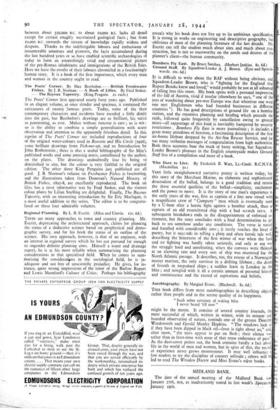VERY little straightforward narrative poetry is written today, b ut this
story of the Merchant Marine, an elaborate and sophisticated descendant of the ballad, belongs to a good tradition and retains , the three essential qualities of the ballad—simplicity, excitement u and the power to move. It is the story of one man's experience in the early years of the war, first as captain of a fine new vessel wi a magnificent crew of " Company " men which is eventually sunk by a U-boat after a heroic fight against a bomber attack, then as captain of an old resuscitated ship with a bad scratch cre.v. A ' subsequent breakdown ends in the disappointment of enforced re- tirement, but the story concludes with a final determination to get back to sea somehow under any conditions. The verse is varied and handled with considerable ease ; it rarely reaches the level d poetry, but it succeeds in telling a plain and often heroie tale well, describing the bitterness of the first winter of war when the land and air fighting was hardly taken seriously, and only at sea was the struggle hard and unrelenting, when the convoys were thinned at an alarming rate and every sort of ship was mustered for the North Atlantic passage. It describes, too, the rescue of a Norwegian u master mariner, the only survivor in a drifting lifeboat ; the death e. of friends in torpedoed ships ; a sudden leave in London in the 'n blitz ; and mingled with it all a certain amount of personal history and reminiscence and the record of aspirations and beliefs.


























 Previous page
Previous page